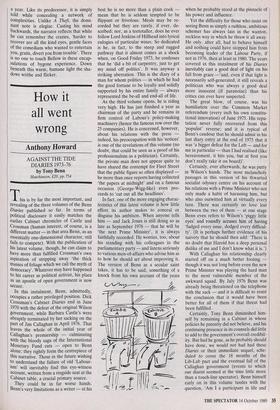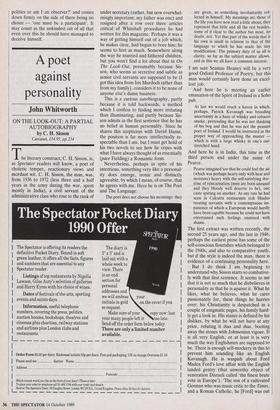How it all went wrong
Anthony Howard
AGAINST THE TIDE DIARIES 1973-76 by Tony Benn
Hutchinson, £20, pp.754
This is by far the most important, and revealing of the three volumes of the Benn Diaries published so far. In terms of political disclosure it easily matches the earlier Cabinet chronicles of Castle and Crossman (human interest, of course, is a different matter — in that area Benn, as an essentially one-dimensional character, still fails to compete). With the publication of his latest volume, though, he can claim to have more than fulfilled Crossman's own aspiration of stripping away 'the thick masses of foliage which we call the myth of democracy'. Whatever may have happened to his career as political activist, his place as an apostle of open government is now secure.
In this instalment, Berm, admittedly, occupies a rather privileged position. Dick Crossman's Cabinet Diaries end in June 1970 with the defeat of the original Wilson government, while Barbara Castle's were abruptly terminated by her sacking on the part of Jim Callaghan in April 1976. That leaves the whole of the initial year of Callaghan's premiership — culminating with the bloody saga of the International Monetary Fund cuts — open to Benn alone: they rightly form the centrepiece of this narrative. Those in the future wishing to understand the failure of old `Labour- ism' will inevitably find this eye-witness account, written from a ringside seat at the Cabinet table, a crucial primary source.
They could be in far worse hands. Bern's very limitations as a writer — at his best he is no more than a plain cook mean that he is seldom tempted to be flippant or frivolous. Meals may be re- corded but they are rarely, if ever, de- scribed; nor, as a teetotaller, does he ever follow Lord Jenkins of Hillhead into lyrical eulogies of particular wines. So dedicated is he, in fact, to the steep and rugged pathway that it almost comes as a shock when, on Good Friday 1973, he confesses that he 'did a bit of carpentry, just to get my mind off politics'. It was. anyway a striking aberration. This is the diary of a man for whom politics — in which he had the good fortune to be loyally and solidly supported by his entire family — always represented the be-all and end-all of life.
As the third volume opens, he is riding very high. He has just finished a year as chairman of the party and he remains in firm control of Labour's policy-making machinery (hence the famous row over the 25 companies). He is concerned, however, about his relations with the press indeed, his preoccupation with his `notices' is one of the revelations of this volume (no doubt, that could be seen as a proof of his professionalism as a politician). Certainly, the private man does not appear quite to have shared the contempt for Fleet Street that the public figure so often displayed he more than once reports having collected `the papers at midnight' and on a famous occasion (George-Wigg-like) even pro- ceeds to `cut out all the headlines'.
In fact, one of the more engaging charac- teristics of this latest volume is how little effort its author makes to conceal or disguise his ambition. When anyone tells him — and Jack Jones is still doing so as late as September 1976 — that he will be `the next Prime Minister', it is always faithfully recorded. He worries, too, about his standing with his colleagues in the parliamentary party — and listens seriously to various men-of-affairs who advise him as to how he should set about improving it. The version of Benn as a secular saint takes, it has to be said, something of a knock from his own account of the years when he probably stood at the pinnacle of his power and influence.
Yet the difficulty for those who insist on seeing Benn as simply a ruthless, ambitious schemer has always lain in the wanton, reckless way in which he threw it all away. He only, after. all, had to behave himself and nothing could have stopped him from becoming leader of the Labour Party, if not in 1976, then at least in 1980. The years covered in this instalment of his Diaries inevitably cast a good deal of light on his fall from grace —'and, even if that light is necessarily self-generated, it still reveals a politician who was always a good deal more innocent (if paranoiac) than his critics can ever have suspected.
The great blow, of course, was his humiliation over the Common Market referendum (every inch his own constitu- tional innovation) of June 1975. His repu- tation never fully recovered from this `populist' reverse; and it is typical of Benn's candour that he should admit in his last diary entry at the end of 1975 that it was 'a bigger defeat for the Left — and for me in particular — than I had realised (like bereavement, it hits you, but at first you don't really take it on board)'.
Certainly, ever afterwards, he was putty in Wilson's hands. The most melancholy passages in this version of his thwarted socialist odyssey centre on his account of his relations with a Prime Minister who not only made a habit of harassing him, but who also outwitted him at virtually every turn. There was certainly no love lost between the two of them — at one stage Benn even refers to Wilson's 'piggy little eyes' and roundly accuses him of having `fudged every issue, dodged every difficul- ty'. (It is perhaps further evidence of his naivety that he should then add: 'There is no doubt that Harold has a deep personal dislike of me and I don't know what it is.') With Callaghan his relationship clearly started off on a much better footing though it was not long before even the new Prime Minister was playing the hard man to the most vulnerable member of the awkward squad. By July 1976 Benn was already being threatened on the telephone with the sack — and it is difficult to resist the conclusion that it would have been better for all of them if that threat had been fulfilled.
Certainly, Tony Benn diminished him- self by remaining in a Cabinet in whose policies he patently did not believe, and his continuing presence in its counsels did little to add to the government's overall credibil- ity. But had he gone, as he probably should have done, we would not had had these Diaries or their immediate sequel, sche-
duled to cover the 18 months of the Lib-Lab pact and the eventual fall of the Callaghan government (events to which our diarist seemed at the time little more than a touch-line spectator). Benn himself early on in this volume tussles with the question, 'Am I a participant in life and politics or am I an observer?' and comes down firmly on the side of there being no choice — 'one must be a participant'. It may count as the unkindest cut of all that even over this he should have managed to deceive himself.



























































 Previous page
Previous page